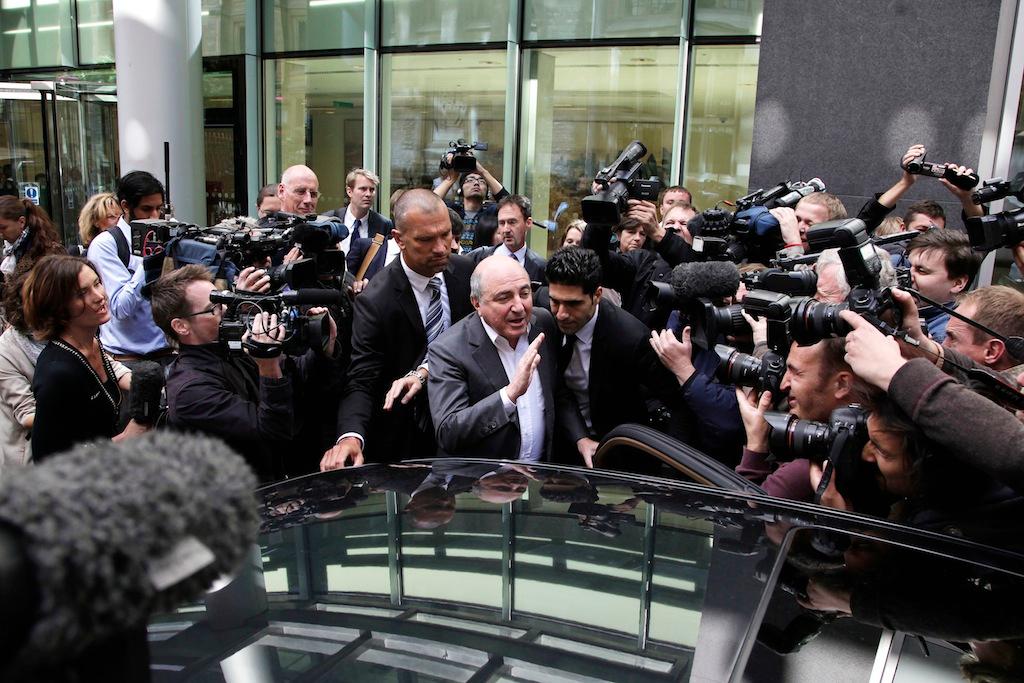How people close to Russian oligarch Berezovsky have wound up dead
Boris Berezovsky addresses the media outside the Royal Courts of Justice after losing his lawsuit against Chelsea FC owner Roman Abramovich on Aug. 31, 2012 in London, England.
When the exiled Russian oligarch was found dead in his London home this weekend, speculation immediately turned to murder.
Violent death, after all, had followed Boris Berezovsky throughout his adult life.
Berezovksy fell out of favor with the Kremlin shortly after Vladimir Putin took power. President Boris Yeltsin stepped down in 1999, and Berezovsky, as one of Yeltsin's close advisors known as the "Family", helped select Putin to succeed him.
It was an incredibly important decision for all of Russia's super rich oligarchs. They needed someone who could hold the country for capitalism as, towards the end of the Yeltsin administration, it was unclear whether or not the communists would come back in to power, repossess all the companies that were privatized, and ruin the party for Russia's new elite (the oligarchs).
Berezovsky thought Putin was the man for the job, but Vanity Fair describes how their relationship soured about a year after Putin took office in 2000:
In August, a Russian nuclear submarine, the Kursk, sank off Russia’s Arctic coast; 118 men died, 28 of them likely as a result of bungled rescue efforts that the country watched unfold in real time. The tragedy became a public-relations disaster, in part because Berezovsky’s O.R.T. aired an audio recording of the president’s meeting with victims’ families, during which Putin lost his temper, lashing out at the families and at unnamed enemies. By this time, another oligarch and media magnate, Vladimir Gusinsky, had been jailed briefly and forced to leave the country—but only after signing his media assets over to a state-owned company. The same fate now seemed likely to befall Berezovsky.
In October 2000, the French newspaper Le Figaro published an interview with Putin in which he held forth on the oligarchs: “Generally, I don’t think that the State and the oligarchs are irreconcilable enemies. Rather, I think that the state is holding a big club in its hands, which it will use only once. To deliver a crushing blow on the head. We haven’t yet resorted to that club. We just picked it up—and that was enough to attract public attention. But if we get really angry, we will not hesitate to use it.”
Berezovsky read this interview at his vacation home in Cap d’Antibes, France. He took it as a direct threat—confirmed by a summons to present himself for interrogation—and decided not to return to Moscow. He has lived in exile ever since.
So Berezovsky lived to regret his role as king-maker. He used his estimated $3 billion fortune to bring down the Putin regime from his new home in London. He even admitted that openly to Reuters in 2006, which prompted the British government to ask him to stop meddling in Russian affairs.
It was essentially a request for him to save his own life, as it was around this time that people with connections to Berezovsky started winding up dead.
The most famous of these mysterious deaths is the case of Russian spy, anti-Putin activist, and former KGB agent Alexander Litvinenko. In 2006 he was poisoned when radioactive polonium 210 was slipped into his tea. US and British officials had never seen anything like it.
Litvinenko's wife, for what it's worth, told the Telegraph she does not believe Berezovsky killed himself, despite his depressed state at the end of his life.
"From my point of view it is not likely that he committed suicide," she said. "He had a lot of enemies. He was an outspoken person and never tried to hide what he thought.
"When I talked to him last he was a little recovered and I believed he would be better. He started to take interest and to ask about my son."
Another former KGB officer who met with with Litvinenko the day he was poisoned, Dmitry Kovtun, was also hospitalized after their meeting and had traces of polonium 210 in his system. Kotvun insisted Litvinenko poisoned him.
Then there's Yego Gaidar, a Russian economist that helped carry out the "loans for shares" program that made Berezovsky and other Russian oligarchs so rich. He was a Yeltsin man. The day after Litvinenko was poisoned, he collapsed on a book tour and said he was poisoned as well. He died three years later of a blood clot.
In 2007 Scotland Yard intercepted a plot to kill Berezovsky in London and kicked the suspected hit man out of the UK.
So wouldn't you suspect some foul play here?
More from our partners, Business Insider:
Business Insider: Yahoo buys a mobile news startup founded by a 15-year-old for $30 million
Business Insider: Proposed site for new FBI HQ turns out to be a classified CIA warehouse
Business Insider: How to prepare an amazing TED Talk in one week
Business Insider: French 'Survivor' canceled after death of 25-year-old contestant
Business Insider: Cars keep smashing into a 7-Eleven in New Jersey
We want to hear your feedback so we can keep improving our website, theworld.org. Please fill out this quick survey and let us know your thoughts (your answers will be anonymous). Thanks for your time!
